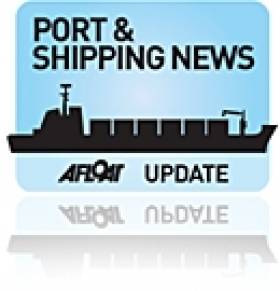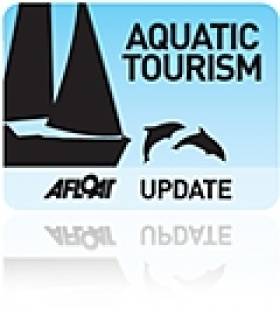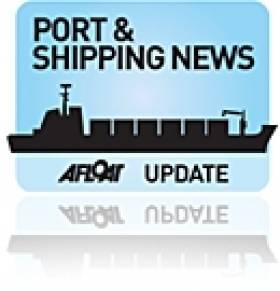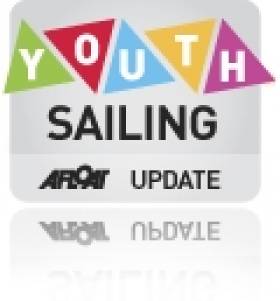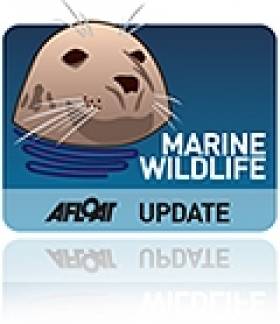Displaying items by tag: Scotland
Floating Windfarm For Scottish Waters
#Windfarm - Scotland is set to host the first floating offshore windfarm in British and Irish waters, as the Guardian reports.
Backed by Norwegian energy giant Statoil, the Hywind Scotland project will comprise five 6MW turbines interconnected by cables and anchored to the seabed, generating energy to power as many as 20,000 homes.
Construction is set to begin off mainland Scotland's easternmost point at Peterhead in the new year, and is expected to see reduced generating costs well below £100MWh.
It's also hoped that the pioneering scheme will lead to the use of more remote and deeper water sites for the windfarms of the future.
The Guardian has more on the story HERE.
Minke Whale Baby Boom off Scotland’s West Coast?
Sightings of juvenile minke whales off Scotland’s west coast increased in 2015 to the highest ever recorded within a survey season, during marine research expeditions carried out by Hebridean Whale and Dolphin Trust – indicating either a significant increase in actual numbers or an influx of minke whales from elsewhere.
The charity’s 2015 research season also recorded the highest annual number of common dolphin sightings since its expeditions began, with 723 individuals observed over 63 encounters. The common dolphin was once uncommon in the Hebrides, but the trust’s encounter rate with the species has more than doubled over the past 12 years, also for reasons that remain unclear.
Kerry Froud, Hebridean Whale and Dolphin Trust Biodiversity Officer, said: “These intriguing changes in Scotland’s marine life highlight the importance of long-term monitoring of cetaceans – so that we can better understand what is happening in our waters, and then make management recommendations to better protect this world-class area of marine biodiversity.”
The studies were carried out between May to October by scientists and volunteers on board Silurian, the trust’s dedicated research yacht. The research forms part of the trust’s unique long-term monitoring of whales, dolphins and porpoises – collectively known as cetaceans – in the Hebrides. Information on basking sharks is also collected during the surveys.
A steady increase in the encounter rate with minke whale juveniles since 2011 was particularly marked this year, with the highest rate of young whales recorded since the trust started boat-based surveys in 2003. The 2015 surveys documented an encounter rate of 1 young minke whale per 286 km – three times the average over the trust’s entire dataset.
The minke whale is the smallest of the baleen whales – species which utilise baleen plates rather than teeth to feed – in the North Atlantic, measuring up to 10 metres in length, and is the most commonly sighted baleen whale species in the UK. Hebridean Whale and Dolphin Trust holds an identification catalogue of 125 minke whales known to have visited the Hebrides – of which some individuals return to the same areas annually, while others may only be passing through.
While an increase in the encounter rate with young minke whales is encouraging, there are still very serious issues regarding the conservation of this migratory species. To the north of Scotland, both Iceland and Norway still hunt minke whales. It remains unknown whether or not the minke whales that swim through Scottish waters frequent the waters where they risk being hunted.
The record number of common dolphin sightings – coupled with the most northerly sighting of the species ever recorded in September this year, off Tromso in Norway – suggests that changes are underway within our seas and oceans. The causes, and wider effects on the marine environment and other species, are still unclear – underlining the importance of on-going research.
Additionally, the number of white-beaked dolphin encounters almost doubled in comparison to 2014, although many of these encounters were made during one particular day of survey around the Butt of Lewis. This rarer, colder water species is confined to the north Atlantic and prefers temperate to sub-Arctic waters – meaning that the warming of Hebridean seas, at a rate of 0.5°C per decade, is expected to exert increased pressure on the populations found off Scotland’s west coast.
White-beaked dolphins have been the focus of acoustic research by Hebridean Whale and Dolphin Trust, with a study in 2013 discovering that white beaked dolphin populations off the east and west coasts of Scotland have distinct acoustic signatures, almost like accents.
Alongside warming seas and climate change, human activities causing increasing stress on cetaceans and basking sharks include fisheries by-catch, pollution, underwater noise and habitat loss.
Cetacean entanglement in litter and fishing gear can cause mobility problems, injury and even death, and the trust is working cooperatively with the fishing industry and other researchers in the UK to better understand this problem so that it can be addressed. This year, ironically whilst the Silurian crew was celebrating a volunteer’s 60th birthday, a bunch of balloons was retrieved from the water – a reminder that celebratory balloons, even if marketed as ‘biodegradable’, can have lasting consequences for our wider environment.
Silurian – previously used in filming of the BBC’s The Blue Planet series – covered more than 4,000 nautical miles in 2015, its crew of volunteers and marine scientists documenting more than 1,200 encounters with cetaceans and basking sharks, and recording almost 625 hours of underwater detections of cetaceans using specialist listening equipment.
Despite less than favourable weather conditions, the overall encounter rate remained steady, with eight sightings of cetaceans per 100 km recorded, compared to nine per 100 km in 2014 and five per 100 km in 2013.
The annual surveys depend on paying volunteers. In 2015, 69 dedicated volunteers clocked up 760 survey hours – working with marine scientists to conduct visual surveys and acoustic monitoring with hydrophones (underwater microphones) monitored by computers, and identifying individual cetaceans through photography of dorsal fins.
The trust – based in Tobermory on the Isle of Mull – is recruiting volunteers for its 2016 surveys, to live and work as citizen scientists onboard Silurian for expeditions of one to two weeks from April to September. Participation costs cover boat expenses, support the trust’s research programme and include accommodation, training, food and insurance. For details, contact Morven Russell at [email protected], call 01688 302620, or visit www.hwdt.org.
Hebridean Whale and Dolphin Trust has been monitoring marine mega fauna in the Hebrides for 13 years, and is the only organisation collecting long-term data on such a large scale on Scotland’s west coast. A short film about its marine surveys is above.
Western Scotland’s seas are one of Europe’s most important habitats for cetaceans and one of the UK’s most biologically productive areas. So far 24 of the world’s 83 cetacean species have been recorded in the region, many being national and international conservation priority species.
Ireland Senior Team Named For Home International Regatta
#ROWING: The Ireland senior team for the Home International Regatta in Strathclyde in Scotland on July 25th has been named. Justin Ryan, who was a senior Ireland international in 2013, will compete in the lightweight single sculls. The selection was based on performances at Cork Regatta, but the times used were from the manual system, as there were problems with the automatic system. The athlete levy will be €400.
| SENIOR MEN |
|---|
| The following Senior Men have been selected to compete for Rowing Ireland at the |
| Home International |
| Regatta 2015 |
| SENIOR |
| MEN SCULLING |
| 1 |
| x |
| Luke Keating |
| Carlow RC |
| Lwt 1 |
| x |
| Justin Ryan Skibbereen RC |
| 2x |
| Fionnan Groome Commercial RC |
| Ronan Allen Garda BC |
| Lwt 2x |
| Declan O’Connor St Michaels RC |
| Raymond O’Mahony Waterford BC |
| 4x |
| Justin Ryan Skibbereen RC |
| Declan O’Connor St Michaels RC |
| Luke Keating Carlow RC |
| Fionnan Groome Commercial RC |
| SENIOR |
| MEN SWEEP |
| 2 |
| - |
| Neil Gahan Commercial RC |
| Colm Dowling Commercial RC |
| Lwt 2 |
| - |
| TBD |
| 4 |
| - |
| Max Murphy UCD BC |
| Niall Farrell UCD BC |
| Ken McCarthy Skibbereen RC |
| Murray Connolly Skibbereen RC |
| 4+ |
| Andy Harrington UCC RC |
| Alex O’Riordan UCC RC |
| David O’Leary UCC RC |
| Sean O’Sullivan UCC RC |
| Gavin Connolly - Cox Commercial RC |
| 8+ |
| Neil Gahan Commercial RC |
| Colm Dowling Commercial RC |
| Max Murphy UCD BC |
| Niall Farrell UCD BC |
| Ken McCarthy Skibbereen RC |
| Murray Connolly Skibbereen RC |
| Andy Harrington UCC RC |
| Alex O’Riordan UCC RC |
| Gavin Connolly - Cox Commercial RC |
| The crews listed above are not listed in seat order in t |
| he boats |
| Page 2 of 3 |
| SENIOR WOMEN |
| The following Senior Women have been selected to compete for Rowing Ireland at |
| the Home International |
| Regatta 2015 |
| SENIOR |
| WOMEN SCULLING |
| 1 |
| x |
| Julia Vascotto Castleconnell |
| BC |
| Lwt 1 |
| x |
| Sarah Quinn Belfast BC |
| 2x |
| Olivia Blundell Belfast BC |
| Chloe Deyermond MCB RC |
| Lwt 2x |
| Phoebe Mulligan Belfast BC |
| Kirstie Turner Belfast BC |
| 4x |
| Sarah Quinn Belfast BC |
| Phoebe Mulligan Belfast BC |
| Kirstie Turner Belfast BC |
| Julia Vascotto Castleconnell |
| BC |
| The crews listed above are not listed in seat order in t |
| he boats |
| SENIOR |
| WOMEN SWEEP |
| 2 |
| - |
| Michelle Lonergan Shannon RC |
| Helen Ryan Shannon RC |
| Lwt 2 |
| - |
| TBD |
| 4 |
| - |
| Aoife Gilligan Shannon RC |
| Karen Joy Shannon RC |
| Dineka Maguire QUBLBC |
| Aine De Baroid QUBLBC |
| 4+ |
| Anne O’Leary Commercial RC |
| Edel Garry Commercial RC |
| Martina Bracken Commercial RC |
| Emma Feerick Neptune RC |
| Shauna Fitzsimons – Cox Commercial RC |
| 8+ |
| Michelle Lonergan Shannon RC |
| Helen Ryan Shannon RC |
| Anne O’Leary Commercial RC |
| Edel Garry Commercial RC |
| Aoife Gilligan Shannon RC |
| Karen Joy Shannon RC |
| Martina Bracken Commercial RC |
| Emma Feerick Neptune RC |
| Shauna Fitzsimons - Cox Commercial RC |
| The crews listed above are not listed in seat order |
Grounded Cargo Ship Moved To Safer Anchorage
#Shipping - Stricken cargo ship the Lysblink Seaways was set to be moved to a safe haven yesterday afternoon (25 February) in advance of poor weather.
As previously reported on Afloat.ie, the 120m-long vessel ran around near Ardnamuchan Point in Scotland's West Highlands a week ago while en route from Belfast to Norway.
The ship later refloated in high tide a day after her hull was lifted onto the rocky shore near Kilchoan.
Divers began inspections for damage as the Lysblink Seaways dropped anchor near the grounding spot in Mingary Bay.
But according to Practical Boat Owner, severe weather forecast for the next few days prompted quick action to pump out more than 150 tonnes of fuel from the ship.
She was then scheduled to be towed to a safe anchorage at Scallastle Bay in the Sound of Mull, some 17 miles away.
Practical Boat Owner has more on the story HERE.
British Marine Federation Launch Scotland's Marine Tourism Strategy
#aquatictourism – The British Marine Federation is launching a Marine Tourism Strategy in March at the Scottish Tourism Week National Conference. Over 500 decision makers and key players in the tourism industry will be attending the event.
By 2020, the BMF say they want Scotland to be: "A marine tourism destination of first choice for high quality, value for money and memorable customer experience delivered by skilled and passionate people."
The Marine Tourism Strategy is an initiative led by a working group of industry leaders and user groups together with public agencies and enterprise bodies to focus on the sustainable growth of Scotland's marine leisure sector. 'With your help we can build the economic benefits of marine tourism for Scotland as a whole, and for all of our individual businesses, teams, employees and families' says BMF.
Scotland's marine environment is one of its crown jewels and encompasses some of the world's most beautiful and varied boating waters. Whether visitors seek adventure, wildlife, family boating experiences, day or extended visits, coastal, offshore or inland waters, Scotland's marine offer is complete, varied and of the highest standard.
Cargo Ship Stuck On Rocks In Scotland's West Highlands
#Shipping - A cargo ship en route from Belfast to Norway has run aground near Ardnamurchan Point in Scotland's West Highlands.
And as BBC News reports, the UK coastguard believes it will be stuck there for some time.
The Lysblink Seaways, a 120m-long vessel, found its hull lifted onto the rocky shore after getting into difficulty off Kilchoan in the early hours of yesterday morning (18 Feburary).
There are no reports of injuries among the nine crew on board, and tugs are on the way to try to dislodge the hull from its perch.
BBC News has images of the stricken ship HERE.
Youngster Becomes One of the 'Youngest Ever' Professional Yacht Masters, Aged Just 18
#youthsailing – A young Cumbrian lad is celebrating after becoming one of the youngest ever professional yacht masters, at the tender age of 18. Former Windermere School pupil, Dominic Jackson, has passed the 'professional yacht master offshore course', delivered by the North West Sports Centre on the island of Cumbrae, in Scotland. Dominic, who is described by his family as a 'natural sailor', started learning the ropes aged 10, at the International School in Qatar.
Registered disabled, having been born with only one hand, Dominic successfully completed the gruelling 18 week course, along with two other students, sailing throughout the night and until 3am up the East Coast of the Isle of Bute, with only skill and calculation to guide him; no technical assistance was permitted. Now qualified to skipper his own yacht, Dominic looks set for a future on the waves.
"We are all immensely proud of Dominic and delighted for him that he can start building a future in the field that he loves." said his father, Chris Jackson, who runs cottage letting agency, Heart of the Lakes, with his parents, Peter and Sue. "He has worked extremely hard and his qualification is an extraordinary achievement, particularly for someone so young."
"To pass this course aged 18 is very unusual. There are not many who can do it." said Cumbrae's Professional Yacht Master Instructor, Rod Smith. "The course is very intense and involves all aspects of learning, from skippering a boat, to the theoretical elements, such as navigation and meteorological testing. Dominic was an exceptional candidate and we applaud him on his achievement. Passing this aged 18, is pretty much as young as you can get!"
Scottish Scientists At A Loss To Explain Beaked Whale Strandings
#MarineWildlife - An "unusually large number" of Cuvier’s beaked whale strandings in western Scotland in recent weeks has baffled marine scientists, as The Scotsman reports.
Five of the rarely seen species were found washed up on Scotland's west coast in late December, a five-fold rise on the annual average.
And as Dr Conor Ryan of the Hebridean Whale and Dolphin Trust states, there are "no obvious clues as to what is causing such an obvious increase in strandings."
Recent stormy conditions may be a factor, he said, but alone they don't explain "why we are finding just one deep-diving species in such high numbers."
According to BBC Earth, Cuvier's beaked whales are the deepest diving of any large marine wildlife, plunging almost 3km into the depths in search of food, thanks to a unique physiology that allows them to withstand the crushing pressures and lack of oxygen.
It's possible that the whales may have succumbed to 'the bends' – which killed 14 beaked whales that washed up in the Canaries in 2002 – but the poor condition of the carcasses has ruled out any clues that a postmortem might provide.
The Scotsman has more on the story HERE.
Video Shows Shocking Moment As Aran Islands Trawler Disappears Under Scottish Waves
#Rescue - Mail Online has more on the dramatic rescue of Aran Islands fishermen from an Irish trawler that sank off Scotland's Outer Hebrides last week.
As previously reported on Afloat.ie, three of the five crew were airlifted to hospital with suspected hypothermia after the Iúda Naofa began taking on water some 48 miles off Lewis in the far north-west of Scotland.
But new video from HM Coastguard shows the shocking moment as the crew escaped their trawler just before it disappeared beneath the waves in a mere 35 seconds.
Minutes beforehand, coastguard crew members had attempted to clear the water from the boat with a salvage pump but the vessel was quickly overwhelmed.
Micheál Ó Conghaíle, a deckhand on the boat skippered by his father Mairtín, describes how what was a normal fishing expedition went south after the rough waters "got the better" of their pumps.
Yet he and the rest of the crew are thankful for getting out relatively unscathed just weeks after the loss of eight crew on a cargo ship in the Pentland Firth.
Mail Online has much more on the story HERE.
Aran Islands Fishermen Rescued Off Scotland
#Rescue - Five crew on an Aran Islands fishing trawler were rescued yesterday (Tuesday 20 January) after the vessel sank off Scotland's Outer Hebrides.
As BreakingNews.ie reports, the trawler Iúda Naofa began tanking on water some 48 miles off Lewis in the far north-west of Scotland.
Three of the five crew were airlifted to hospital for treatment for hypothermia while the others were evacuated to a nearby fishing boat also from the Aran Islands.
According to The Irish Times, the Iúda Naofa is owned by Mairtín Ó Conghaíle of Inis Mór.
Four of its crew are natives of the islands, the fifth being a Romanian national.




























